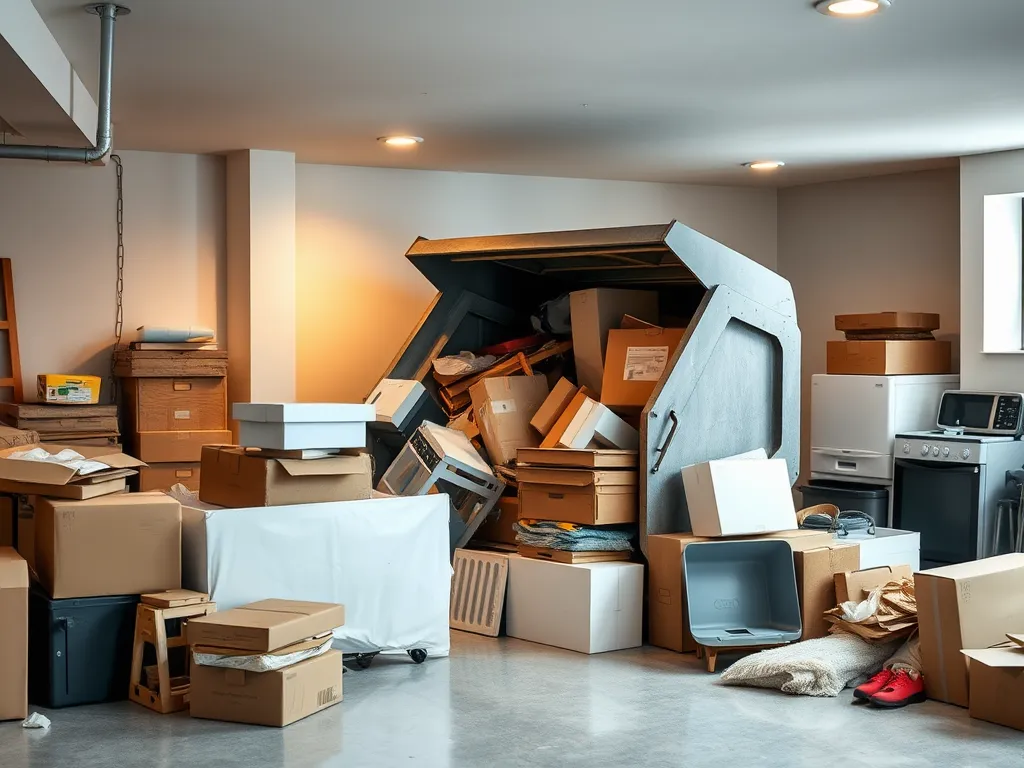Top Tips for Dumpster Rental in Basement Cleanouts

A Comprehensive Guide to Dumpster Rental for Basement Cleanouts
A basement cleanout is often necessary for homeowners looking to reclaim their space, and one of the most efficient ways to do this is through dumpster rental. A dumpster rental basement cleanout allows you to dispose of unwanted items safely and legally while providing a convenient solution for debris and junk removal.
When undertaking a basement cleanout, homeowners typically find themselves faced with years of accumulated possessions that may not serve a purpose any longer. A dumpster serves as an essential tool for efficiently handling the removal of these items. When you choose dumpster rental for your basement cleanout, you can take control of the process and make informed decisions about what to keep, recycle, or discard.
Transform your cluttered space into a functional area by exploring these 6 Effective Tips For Cleaning Your Basement that promise great results.
The benefits of dumpster rental are countless, particularly when it comes to organizing and decluttering your home. Not only does renting a dumpster simplify the disposal process, but it also fosters a healthier living environment by ensuring that unwanted waste is removed promptly. Choosing the right dumpster for your basement cleanout can make all the difference in making the process smooth and effective.
By being proactive about your cleanout, utilizing dumpster rental services, you can embrace the transformation of your basement from a cluttered storage area into a functional space. This article will explore the various aspects of dumpster rental for basement cleanouts, from benefits and sizing options to preparation tips and post-cleanup strategies.
With the right approach to dumpster rental basement cleanout, you will not only successfully declutter your basement but also positively impact your home’s overall organization and aesthetics.
Benefits of Dumpster Rental for Basement Cleanouts
One of the key benefits of utilizing dumpster rental for your basement cleanout is its cost-effectiveness. By renting a dumpster, homeowners can avoid multiple trips to the landfill, which can be both time-consuming and expensive. A flat rental fee often covers all disposal costs, making it a budget-friendly solution for large-scale cleanouts.
Time-saving is another significant aspect of renting a dumpster for your basement cleanup. Instead of making several trips back and forth to dispose of junk, having a dumpster on-site allows you to quickly toss out unwanted items as you work. This means more time spent organizing and less time worrying about junk removal logistics.
Moreover, renting a dumpster promotes environmental responsibility through proper waste disposal. Reputable dumpster rental companies prioritize recycling and responsible disposal methods, ensuring that as much waste as possible is diverted from landfills. This contributes to reducing the overall environmental impact of your cleanout project.
Lastly, a dumpster rental helps avoid clutter and maintain organization throughout the cleanout process. Having a designated space to discard items promotes a sense of order and allows you to visualize the area’s potential more effectively as you clear debris and junk.
Choosing the Right Dumpster Size
When it comes to dumpster rental for your basement cleanout, selecting the right size is essential. Common dumpster sizes for basement projects include 10, 20, and 30 cubic yards. A smaller 10-yard dumpster may suffice for minor cleanouts, while a larger 30-yard dumpster is ideal for extensive clear-outs involving numerous bulky items.
To determine the size of dumpster needed, assess the volume of items you plan to dispose of. Consider the number of boxes, furniture, appliances, and other materials you want to get rid of. If you’re unsure, it’s always better to opt for a slightly larger size, as this can save you from needing a second dumpster later on.
Estimating basement junk volume can also be accomplished by measuring the area where you’ll be working. Count how many cubic yards of space the rubbish would fill; this can help in selecting an appropriate dumpster size. Also, remember to factor in any heavy or bulky items that may take up significant space.
Additionally, you'll want to explore the options between roll-off and front-load dumpsters. Roll-off dumpsters are typically used for short-term projects like cleanouts, as they are easy to load. On the other hand, front-load dumpsters are often used for ongoing waste disposal needs and are emptied on a scheduled basis.
Preparation Tips Before Renting a Dumpster
Before renting a dumpster, it's crucial to clear space and prepare for delivery. Ensure that there is easy access for the dumpster truck, considering factors such as overhead trees or narrow driveways that may hinder placement. An open space like a driveway or large yard is typically ideal for maximizing convenience.
Understand local regulations and permits before rental as they may vary by city or county. Some areas require permits for placing large dumpsters on driveways or streets. Be sure to check with your local regulations to avoid potential fines or ambiguities during your cleanout process.
Creating a clear timeline for your basement cleanout is essential. Eliminate unnecessary delays by planning when the dumpster will be delivered and establishing specific days for sorting and disposing of items. A well-structured timeline will keep you accountable and focused throughout the cleanout process.
Gather necessary tools for the cleanup ahead of time. Tools such as gloves, cartons for sorting, masks, and any necessary cleaning supplies will help you tackle the cleanup process efficiently, ensuring that you're prepared for any surprises you may encounter in your basement.
What to Put in a Dumpster for Basement Cleanup
When using a dumpster for basement cleanup, it’s important to know what materials are acceptable for disposal. Typical materials include furniture, appliances, carpet, boxes, and general household junk. Always consult with the rental company for guidance, as rules may vary.
Hazardous waste guidelines are also critical to understand while cleaning. Items like paint, chemicals, batteries, and electronics often require special disposal procedures. Make sure to identify any hazardous materials prior to the cleanup and check with your rental service about proper disposal options.
Recycling options for basement items should not be overlooked. Many local municipalities offer recycling programs for old electronics and appliances, so check for nearby facilities or donation centers. Ensuring that recyclable materials do not end up in the dumpster reduces waste and supports a sustainable approach.
Lastly, electronics and appliances disposal rules can differ greatly from regular junk. Research local regulations regarding disposal, as some items may require specific drop-off locations or may not be accepted in dumpsters due to regulations on electronic waste.
DIY vs Hiring Professionals for Basement Cleanouts
When contemplating a basement cleanout, consider the cost comparison of DIY versus professional help. While DIY can save costs associated with labor, it may also involve added expenditures for rental fees, tools, and your time. Hiring professionals may have higher upfront costs, but these services often guarantee efficiency and expertise.
There are instances when hiring a junk removal service makes sense. If your basement contains heavy furniture, hazardous materials, or if you simply lack the time or energy for a full cleanout, hiring professionals can provide peace of mind and alleviate stress during the process.
However, there are notable benefits to doing it yourself. DIY cleanouts allow for personal control over organizing and selecting what to keep. You can also enlist family and friends to help, turning the cleanup into a collaborative effort while saving on costs.
For those insisting on DIY, planning and execution tips such as detailed itemization of what to keep and throw away can lead to a successful cleanout. Prepare a strategy of sorts, starting from sorting items by category and then tackling one section of the basement at a time.
Post-Cleanup: What to Do After the Dumpster is Gone
Once the dumpster is gone, you will need to reorganize your basement effectively. Take the time to assess how much space you’ve cleared and evaluate your basement layout to optimize storage. Consider utilizing shelving units and storage containers to keep items organized.
Establishing long-term waste management strategies is crucial for maintaining a clean and functional basement. Introduce a regular decluttering routine, and determine a process for regularly assessing and disposing of items that are no longer needed.
Planning for future basement needs is another aspect to consider. Whether you plan to convert your basement into a functional living space or simply want to maintain an organized storage area, having a long-term vision will motivate you to keep things in order.
Lastly, assessing items for donation or recycling can help you give back to the community while keeping waste down. Identify which items are in good condition and seek local charities or organizations that may be interested in accepting your donations. This final step contributes to a cleaner environment and helps someone in need.
